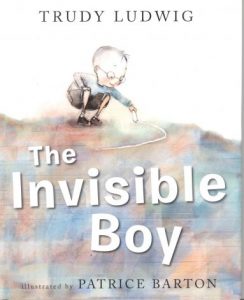 The Invisible Boy
The Invisible Boy
Written by Trudy Ludwig
Illustrated by Patricia Barton
Knopf Books, 2013, 40 pp.
ISBN-13: 978-1582464503
A timid boy named Brian yearns to belong with the rest of his classmates. His classmates are picked for kickball, invited to birthday parties and asked to share during Choosing Time, while Brian is excluded and invisible to his classmates and teacher. But Brian has a talent that helps distract him from his feelings of isolation. Brian loves to draw dragons, tall buildings, superheroes and pirates.
One day a new student, Justin, arrives and during lunch uses chopsticks to eat bulgogi (Korean grilled beef). Everybody laughs at Justin’s food and chopsticks except Brian. The next day Justin finds a message in his cubby with a drawing of Brian saying he thought the bulgogi looked yummy. Justin does not forget this act of kindness and Brian’s good deed leads to a friendship. After finding the note, Justin goes out of his way to include Brian in every activity, and makes room for him at the lunch table. Suddenly, Brian is no longer invisible to his classmates.
Brian is initially drawn small in dull shades of gray in contrast to his classmates, teacher and the classroom, which appear in color. Barton uses soft pencil colors for the illustrations and it is only when Justin invites Brian to join him and his friend Emilio that Brian begins to take on color in the illustrations. From that point, Brian appears in full color in the illustrations. The initial illustrations of Brian without any color capture Brian’s isolation and the addition of color toward the end captures Brian’s feelings of happiness and belonging.
Two books that could be paired with The Invisible Boy are Each Kindness written by Jacqueline Woodson (2012) and Hello, Hello written and illustrated by Matthew Cordell (2012). Each Kindness involves a new girl at school named Maya. Chloe and her friends won’t play with Maya because she wears hand-me-down clothes. Maya tries to join Chloe and her friends to play but they always reject her. Eventually, Maya gives up and plays alone. When the teacher gives a lesson on how small acts of kindness can change the world, Chloe reflects on how she could have shown Maya some kindness. But it is too late as Maya has moved.
Hello, Hello takes a look at being ignored. A young girl’s family is too busy with their gadgets to notice her and the wonderful world around them. She says hello to everyone in her family, but nobody can turn away from their gadgets long enough to do anything more than mumble back a hello, and her brother doesn’t even manage that. Lydia decides to go outside and experience life rather than be plugged into an electronic gadget. She finds that there are so many things to greet. She says hello to the rocks, hello to the leaves, and hello to the flowers. When Lydia goes back home she decides that it is time for her family to say hello to the world and goodbye to their gadgets.
Author Trudy Ludwig is an award-winning children’s writer and lecturer who lives in Portland, Oregon with her husband and two children. She is known for tackling the often-complicated world of children’s social interactions. Children’s books have always been a passion for Ludwig, but it was not until her own daughter was bullied that she turned to writing them. She is an active member of the International Bullying Prevention Association and collaborates with experts and organizations to bring attention to issues that matter to her.
Patricia Barton illustrates both chapter and picture books, adjusting her style in order to better suit each story. In chapter books, Barton believes her job as an illustrator is to support the story but not say too much. In contrast, Barton believes that when she illustrates picture books, her illustrations “speak volumes” and must convey the heart of the matter as well as honor the author’s perspective.
Megan McCaffrey, Governor’s State University, Chicago, IL
WOW Review, Volume IX, Issue 1 by Worlds of Words is licensed under a Creative Commons Attribution-NonCommercial-ShareAlike 4.0 International License. Based on work at https://wowlit.org/on-line-publications/review/ix-1/
